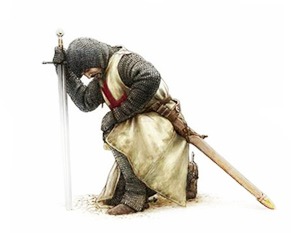“For I will show him how many things he must suffer for My name’s sake.” Acts ix. 16
As the song of him who singeth,
Playing on a harp of gold,
So to me was Christ’s evangel
In the days of old.
Thus across the lake of Constance
Went I forth to preach His Word,
And beside me sat the squire
Of a noble Lord.
None in all the ship so knightly,
None so bravely dight as he-
“Tell me,” I besought, “thine errand
Yonder o’er the sea.”
“I go forth,” he said, “to gather
Many a knight and noble bold;
They shall tilt at joust and tourney,
Whilst fair eyes behold.
“And the bravest and the noblest
He shall win a glorious prize,
Smiles to boot, and courtly favour
In the ladies’ eyes.”
“Tell me what shall be the guerdon?”
“Lo, the fairest in the land
Sets a gold ring on his finger
With her lily hand.”
“Tell me how the knight may win it?”
“Scars and bruises must he boast,
For the knight shall be the winner
Who endures the most.”
“Tell me, if when first assaulted,
He in knightly guise shall stand,
Shall he win the golden guerdon
From his lady’s hand?”
“Nay, right on, till all is over,
Must a worthy knight hold on;
Bear the brunt, and stand a conqueror
When the fight is done.”
“And if he be wounded sorely,
Will he weep and will he mourn?”
“Nay, in place of winning honour,
He would win but scorn.”
Then my spirit sank within me,
And within my heart I spake-
“O my Lord, thus fight the knightly
For their honour’s sake.
“Small the prize, and stern the battle,
Worthless gain, and weary fight-
Lord, a ring of stones most precious
Hast thou for Thy knight!
“Oh, to be the knight of Jesus!
Scorning pain, and shame, and loss;
There the crown, the joy, the glory,
Here, O Lord, Thy Cross.”
Then I wept, with bitter longing
Thus the knight of God to be;
And the Lord, who saw me weeping,
Gave the cross to me.
Bitter pain, and shame, and sorrow
Came upon me as a flood-
I forgot it was the tourney
Of the knights of God.
And again I wept, beseeching,
“Take the Cross, O Lord, from me!”
Till a light broke like the morning
Over the wild sea.
Then there spake the Voice beloved,
Still and sweet my heart within-
“is it thus, O knight of Jesus,
Thou the prize wilt win?”
“O my Lord, the fight is weary-
Weary, and my heart is sore!”
“And,” he answered, “fair the guerdon,
And for evermore.”
“I have shamed Thee, craven-hearted,
I have been Thy recreant knight-
Own me yet, O Lord, albeit
Weeping whilst I fight.”
“Nay,” He said; “yet wilt thou shame Me
Wilt thou shame thy knightly guise?
I would have My angels wonde
At thy gladsome eyes.
“Need’st thou pity, knight of Jesus?-
Pity for thy glorious hest?
On! let God and men and angels
See that thou art blest!
In the middle ages, the knight was the heroic figure men aspired to be in fantasy and deed–a life of bravery and honor. Chivalry demanded a code of ethics–manliness included virtuous conduct and thought, fighting the good fight, speaking words of wisdom, generosity, and kindness. In a world of brutality and wicked tongues, the knight righteously matched violence with violence, cruelty with compassion and intelligence. The defenseless were to be protected, the weak to be venerated, respected and sheltered. A true knight’s every effort was to God and others. In tournaments, the battlefield and life, a knight dedicated his efforts to a chosen damsel. The lady of honor acknowledging his respect by tying a scarf to the knight’s jousting lance or armory. St Francis aspired to be a knight in his younger days, before turning his heroic efforts over to the religious life. His lady of honor became Lady Poverty, captured so lovingly, allegorically, and fantastically in ‘Sacrum commercium Sancti Francisci cum domina Paupertate’ (The Sacred Bond of Saint Francis with Lady Poverty). The idea leads so fittingly into a devotion to Our Holy Mother.


